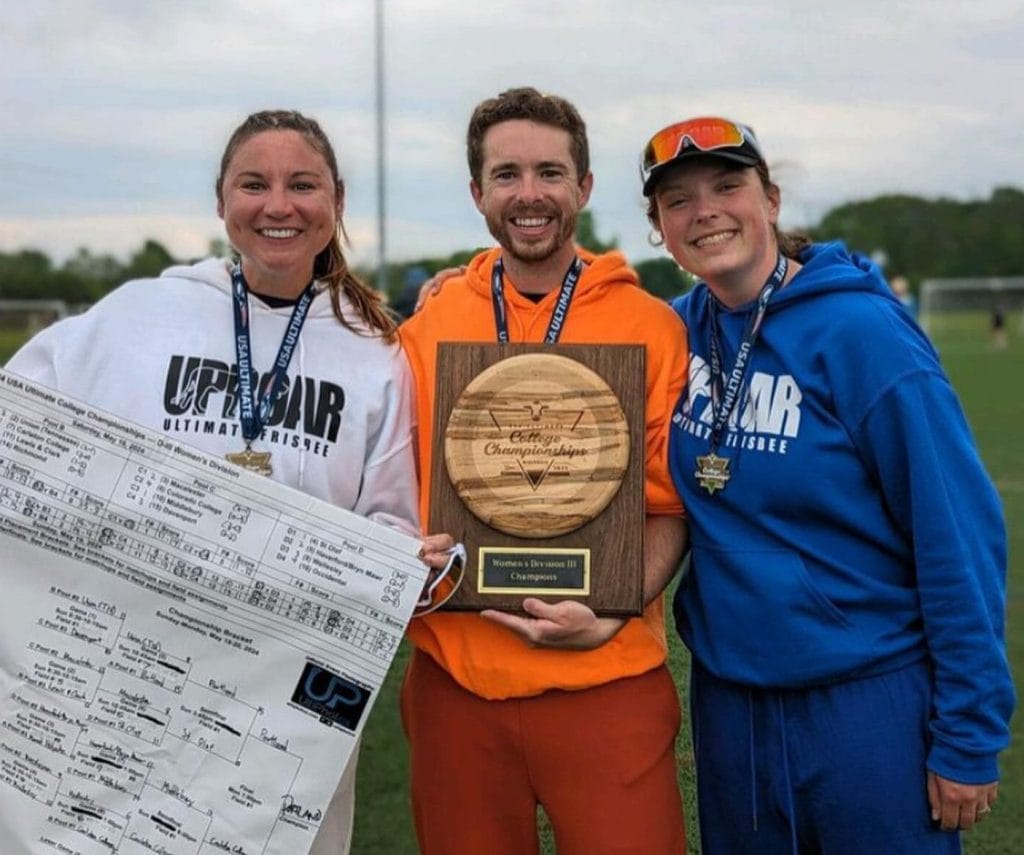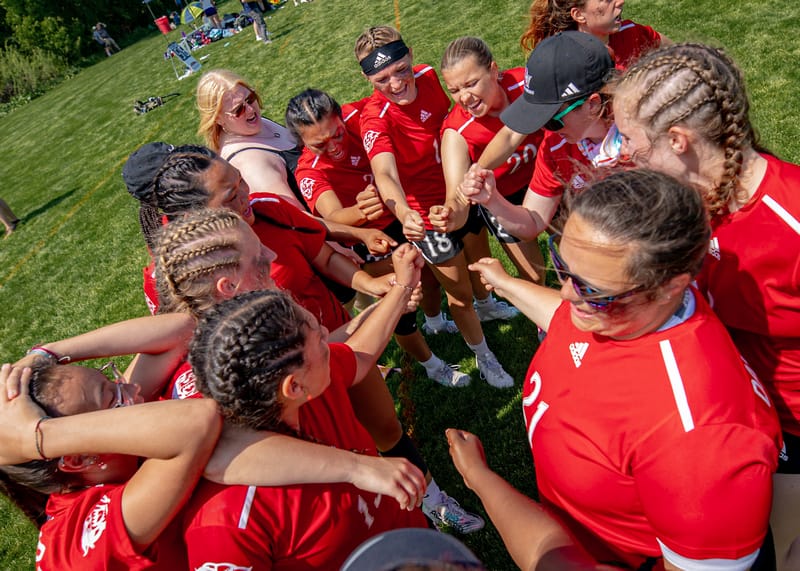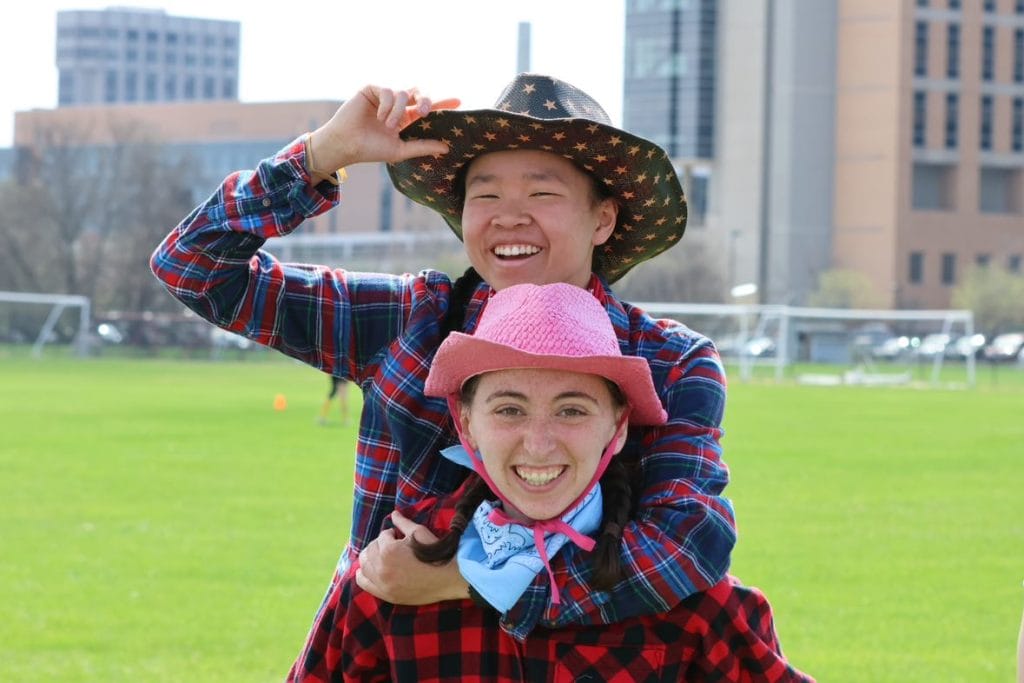Celebrating the best off-field leaders of the season.
June 20, 2024 by Zack Davis and Theresa Diffendal in Awards with 0 comments
Each year, Ultiworld presents our annual College Awards. Our staff evaluates the individual performances of players from throughout the season, talking to folks around college ultimate, watching film, and look at statistics, voting upon the awards to decide those to be honored. The regular season and the college Series are both considered, with extra emphasis for performances in the competitive and high-stakes environment at Nationals.
Our final D-III award podium is for the Coaches of the Year. As so many teams have added more and more sideline-savvy consultants to their roster with less asked of a single head coach, this has essentially morphed into “Coaching Staff of the Year.” Coaches can impact the game in so many ways — tactics, motivation, communication, personnel management, program development, skill-building, etc. — and it can be hard to divine what exactly each has contributed to their team. But good coaching is something we feel “we know it when we see it.”
- Player of the Year
- All-American First Team
- All-American Second Team
- Offensive Player of the Year Award
- Defensive Player of the Year Award
- Breakout Player of the Year Award
- Rookie of the Year Award
- Coaches of the Year Award
D-III Women’s 2024 Coaches Of The Year
Dan Young, Elise Hollowell, and Beckie Zipp (Portland)

It might seem a bit like phoning it in to give the Coach of the Year award to the team that won the national championship. The best team must be the best coached, but often that’s not the case. In fact, D-III women’s is a great example since Middlebury, who infamously don’t have a coach, won the championship three years in a row prior to this season. This year, however, it seemed evident Portland UPRoar were the best team in the nation in large part because of how they were coached. Elise Hollowell, Rebecca Perston, and Daniel Young have built a program that is designed to adapt to the players on the roster, and change with the strength of the team, rather than try to force players to run a specific system.
This is made evident in two different regards. First, the level of consistency of the UPRoar team – Hollowell and Young have been coaching UPRoar since before the pandemic, and not only has the team consistently made Nationals during their tenure, they have also performed well at the tournament, with repeat trips to semifinals. In fact, since 2019 the team hasn’t missed the bracket and their worst finish is top 8. More directly in evidence of the team’s ability to adapt is in the difference in play style between last year and this year. Last year’s UPRoar focused more on spreading the disc around and using the depth of the team to overwhelm the opposition. While the team was still centered around Galian and Ashley, 17 unique players recorded an assist and the most anyone had was Galian and Ashley’s 14. This year’s team was much more focused on letting Galian shine and as a result “only” 11 players recorded assists while Galian tripled her assist count. Two different styles of play, but styles that matched the team on the roster. Hollowell, Zipp, and Young’s ability and willingness to tailor the team’s playstyle to the roster they have is why they won the championship and for that, they are Coaches of the Year.
– Zack Davis
First Runner-Up
Jessica Creamer and Joe Cubitt (Davenport)

When a literal rocket scientist starts coaching ultimate there should be no surprise when the team reaches the stars. Not only that, but Jessica Creamer is without doubt one of the most knowledgeable people on the planet about ultimate. She was able to utilize that vast knowledge base to coordinate a first-year team comprised of fewer than fifteen players, many of whom had not played ultimate prior to this season. What’s more, they made the bracket and ended up one (1) point away from quarters, and maybe even more. Creamer emphasized all season that the main goal was to develop an environment of inclusion and acceptance, and it’s clear she was successful in that. That environment translated to on-field confidence and success, and adding UFA standout Joe Cubitt as a voluntary assistant coach didn’t hurt either. Expect to see more of Coach Creamer and the Davenport Panthers on D-III’s biggest stage.
– Zack Davis
Second Runner-Up
Elise Gallup and Sylvie Mercil (St. Olaf)

St. Olaf had one of the strongest regular seasons of any D-III team in 2024, only losing two games by a combined two points and bageling three different teams en route to earning a pool top seed at Nationals. Vortex entered the postseason at #3 in our rankings and with expectations to match only to encounter a blustery North Central Regionals. With a rough loss to Carleton Eclipse in their mouths, it would’ve been easy to predict Vortex’s downward spiral would continue, but Sylvie Mercil and Elise Gallup were able to pull their squad together mentally and strategically for a dominant Nationals pool play showing.
Similar to Portland, Vortex’s coaches knew how to plan a system that worked for their personnel, helped by a second year of familiarity with the team for both Mercil and Gallup. Leina Goto was the key to a lot of their success last year, but the coaching staff was able to resist the temptation to lean more heavily toward an all Goto all the time strategy and trusted the strength of their down roster players to overwhelm the opposing team’s defensive sets. Recognizing the team would find more success by spreading the disc around and letting Goto absorb pressure in the midfield set up Emily Mulhern to absolutely shred defensive sets from the backfield and players like Elie Mcdonald and Erica Collin to run rampant as a hybrid. That kind of discipline and ego-less ball takes a whole season to engender, and such a season-long focus on growth and process, resulting in a semifinals berth, is more than worthy of COTY honors.
– Zack Davis and Theresa Diffendal